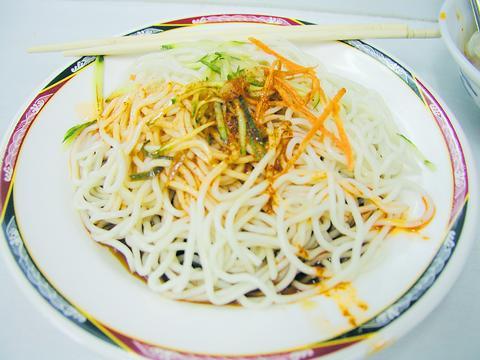Mention noodles and Ximending in the same sentence and most people will think of A-Chung Noodles (阿宗麵線), the tangy tripe noodle stall that often has a line of customers stretching half a block. That probably won't change soon, but there is another tiny eatery in Taipei's buzzing teeny bopper district called Qiong Fang Ju (瓊芳居) that specializes in noodles of a completely different variety and that draws its own throng of hungry fans to the basement of Wan-nian Department Store.
Little larger than a closet, Qiong Fang Ju is a stall operated by three jovial ladies who look as though they've been dipping liberally into their own tasty dishes when the crowds subside. And who can blame them? They're sitting on the secrets to two of the most delicious snacks available in Taipei.

PHOTO: MAX WOODWORTH, TAIPEI TIMES
Normally cold noodles are nothing to shout about, but Qiong Fang Ju has hit upon an especially delectable mix of vinegar, soy and subtle spices for its sauce, while adding color, texture and flavor with healthy portions of grated cucumber and carrots. On sweltering summer days made even less tolerable by shoulder-to-shoulder shopping masses in Ximending, a plate of these noodles is like a gift from the heavens.
Similarly, the dumplings are a delight for the senses, with a soy-and-vinegar sauce that is given some extra kick with additional spices and a fine pastry wrapping that is sturdy and perfectly chewy. The only complaint at the end of eating these tiny Sichuan delicacies will be that half a dozen just isn't enough. That's why many customers find themselves staring at empty dishes and committing for second helpings. Opting for seconds of the noodles and dumplings is probably a better choice than the cold chicken and duck dishes that fill up the rest of this mini-diner's menu.
Like many of the best snack stalls, Qiong Fang Ju places a low premium on decor and comfort. Diners will have to bear with throbbing fluorescent lights, wooden stools and the constant bumping of other diners buttocks into your back when they try to squeeze out of the joint. But it's a small price to pay.

Nine Taiwanese nervously stand on an observation platform at Tokyo’s Haneda International Airport. It’s 9:20am on March 27, 1968, and they are awaiting the arrival of Liu Wen-ching (柳文卿), who is about to be deported back to Taiwan where he faces possible execution for his independence activities. As he is removed from a minibus, a tenth activist, Dai Tian-chao (戴天昭), jumps out of his hiding place and attacks the immigration officials — the nine other activists in tow — while urging Liu to make a run for it. But he’s pinned to the ground. Amid the commotion, Liu tries to

The slashing of the government’s proposed budget by the two China-aligned parties in the legislature, the Chinese Nationalist Party (KMT) and Taiwan People’s Party (TPP), has apparently resulted in blowback from the US. On the recent junket to US President Donald Trump’s inauguration, KMT legislators reported that they were confronted by US officials and congressmen angered at the cuts to the defense budget. The United Daily News (UDN), the longtime KMT party paper, now KMT-aligned media, responded to US anger by blaming the foreign media. Its regular column, the Cold Eye Collection (冷眼集), attacked the international media last month in

A pig’s head sits atop a shelf, tufts of blonde hair sprouting from its taut scalp. Opposite, its chalky, wrinkled heart glows red in a bubbling vat of liquid, locks of thick dark hair and teeth scattered below. A giant screen shows the pig draped in a hospital gown. Is it dead? A surgeon inserts human teeth implants, then hair implants — beautifying the horrifyingly human-like animal. Chang Chen-shen (張辰申) calls Incarnation Project: Deviation Lovers “a satirical self-criticism, a critique on the fact that throughout our lives we’ve been instilled with ideas and things that don’t belong to us.” Chang

Feb. 10 to Feb. 16 More than three decades after penning the iconic High Green Mountains (高山青), a frail Teng Yu-ping (鄧禹平) finally visited the verdant peaks and blue streams of Alishan described in the lyrics. Often mistaken as an indigenous folk song, it was actually created in 1949 by Chinese filmmakers while shooting a scene for the movie Happenings in Alishan (阿里山風雲) in Taipei’s Beitou District (北投), recounts director Chang Ying (張英) in the 1999 book, Chang Ying’s Contributions to Taiwanese Cinema and Theater (打鑼三響包得行: 張英對台灣影劇的貢獻). The team was meant to return to China after filming, but